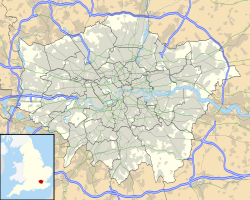Toponymy
The place name ultimately derives from the farmstead and hamlet of Upton, sited at Upton Lane in the parish of West Ham. The place name is first recorded as Hupington in 1203. The place name is thought likely to mean 'at the high lying farmstead'. [1]
The term 'Upton Park' was later applied to a housing estate developed to the east of West Ham Park in the 1880s. [2] The estate took its name from the adjacent village of Upton with the suffix 'Park' added for marketing reasons. The estate's developers paid for a new station to be built which was named after the estate. Consequently, the area surrounding the station became known as Upton Park rather than the term being limited to the original housing estate.
The southern end of Green Street runs alongside the western edge of the former Boleyn Ground, the original home ground of West Ham United FC. The club initially rented the land from Green Street House, known locally as Boleyn Castle because of its imposing nature and an association with Anne Boleyn. The football stadium was commonly known as Upton Park. After the 2015–16 season, West Ham relocated to the former Olympic Stadium in Stratford and the Boleyn Ground has now been demolished.
An unrelated football club of the area, Upton Park FC, were early pioneers in the game, and represented Great Britain at the 1900 Summer Olympics football tournament, where they won the gold medal. They played their home games at West Ham Park, which was host to the first ever FA Cup goal, scored by Jarvis Kenrick for Clapham Rovers in a 3–0 victory over Upton Park on 11 November 1871. [3]
Upton Park F.C was founded in 1866, and is believed to have folded for the second and last time around 1911, while West Ham United were founded as Thames Ironworks F.C. in 1895, before reforming as West Ham in 1900, playing their first games at Upton Park, the Boleyn Ground, from 1904.



